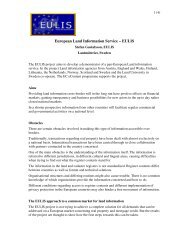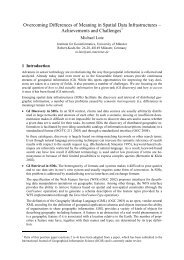Comparative Analysis of NSDI - EC GI & GIS Portal
Comparative Analysis of NSDI - EC GI & GIS Portal
Comparative Analysis of NSDI - EC GI & GIS Portal
You also want an ePaper? Increase the reach of your titles
YUMPU automatically turns print PDFs into web optimized ePapers that Google loves.
Whilst INSPIRE aims to develop a legal framework to underpin the creation <strong>of</strong> a European<br />
SDI starting from priorities in the environmental field, it is clearly important to evaluate the<br />
extent <strong>of</strong> progress <strong>of</strong> SDIs in Europe, and identify key issues that need addressing to ensure<br />
complementarity between European and national/regional developments.<br />
Some <strong>of</strong> the hypothetical principles/expectations <strong>of</strong> European citizens can be summarized as:<br />
• Europe desires common spatial data (e.g., foundation, reference, core) organized<br />
according to standard types and accepted scales, that need to be widely available for<br />
all <strong>of</strong> Europe at the administrative, neighbourhood, city, state, nation and Europeanwide<br />
levels to which other geospatial data can be easily referenced.<br />
• It is believed essential that common spatial data (whether it be a representation <strong>of</strong> that<br />
data or the data itself) be portable, and made readily accessible and available to any<br />
one, at some defined cost, from user-friendly and seamless sources to meet public<br />
need and encourage conformance by producers <strong>of</strong> other geospatial information.<br />
• It is believed essential that both common and other geospatial data be updated<br />
according to commonly established practices, standards and measures <strong>of</strong> quality.<br />
• It is believed that thematic and tabular data be made easily accessible on terms not<br />
incompatible with common data.<br />
• It is believed essential that common and other geospatial data produced by one<br />
organization, political jurisdiction or nation is compatible with similar data produced<br />
by other organizations, political jurisdictions or nations.<br />
• It is believed essential that all geospatial data be capable <strong>of</strong> being integrated with<br />
many other kinds or sets <strong>of</strong> data to produce information useful to decision makers and<br />
the public.<br />
• It is believed that the responsibility for generating, maintaining and distributing<br />
common data is shared by organizations, political jurisdictions or nations and that<br />
Governments at all levels should take advantage <strong>of</strong> private sector capabilities at<br />
competitive prices rather than maintaining dedicated capabilities.<br />
• It is believed that the value <strong>of</strong> common data can only be recognized by government<br />
legislative bodies when the costs <strong>of</strong> generating, maintaining and distributing any<br />
geospatial data are justified in terms <strong>of</strong> public benefit and/or private gains, and there is<br />
a present and future value savings from reducing overlap and duplication among<br />
participating organizations.<br />
• It is believed essential that Europe acknowledge that SDIs are designed top down, but<br />
built bottom up. Taking on the credo "think globally and act locally" is a call that<br />
Europe understands. Having processes in place that account for two-way flows <strong>of</strong><br />
influence are critical.<br />
For the purpose <strong>of</strong> evaluating the extent <strong>of</strong> progress <strong>of</strong> SDIs in Europe, and identifying key<br />
issues that need to be addressed, <strong>GI</strong>NIE convened a meeting <strong>of</strong> experts in the field <strong>of</strong> SDIs,<br />
coming from 13 European countries and the US. The meeting took place at the Joint Research<br />
Centre <strong>of</strong> the European Commission in Ispra, Italy, 6-8 th May 2002.<br />
All aspects <strong>of</strong> SDI implementation were touched upon:<br />
Organizational and fundamental aspects<br />
- Foundation<br />
- Standards<br />
- Legal framework














